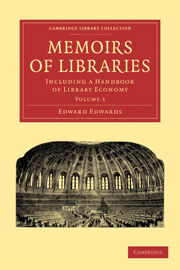Book contents
- Frontmatter
- CHAPTER I RUDIMENTS OF BOOK-COLLECTING; WITH MORE ESPECIAL REFERENCE TO PUBLIC LIBRARIES
- CHAPTER II COPY-TAX
- CHAPTER III GIFTS
- CHAPTER IV PUBLIC HISTORIOGRAPHY AND PUBLIC PRINTING
- CHAPTER V INTERNATIONAL EXCHANGES
- CHAPTER VI PURCHASES
- BOOK II BUILDINGS
- BOOK III CLASSIFICATION AND CATALOGUES
- CHAPTER I CATALOGUES, IN GENERAL
- CHAPTER II CLASSIFICATORY SYSTEMS
- CHAPTER III DIFFICULTIES, RULES, AND DETAILS
- CHAPTER IV TO PRINT, OR, NOT TO PRINT?
- CHAPTER V EXAMPLES, INDEXES, AND ESTIMATES
- CHAPTER VI LOCAL ARRANGEMENT, AND ITS APPLIANCES
- BOOK IV INTERNAL ORGANIZATION AND PUBLIC SERVICE
- GENERAL INDEX
- Plate section
CHAPTER V - EXAMPLES, INDEXES, AND ESTIMATES
Published online by Cambridge University Press: 05 August 2011
- Frontmatter
- CHAPTER I RUDIMENTS OF BOOK-COLLECTING; WITH MORE ESPECIAL REFERENCE TO PUBLIC LIBRARIES
- CHAPTER II COPY-TAX
- CHAPTER III GIFTS
- CHAPTER IV PUBLIC HISTORIOGRAPHY AND PUBLIC PRINTING
- CHAPTER V INTERNATIONAL EXCHANGES
- CHAPTER VI PURCHASES
- BOOK II BUILDINGS
- BOOK III CLASSIFICATION AND CATALOGUES
- CHAPTER I CATALOGUES, IN GENERAL
- CHAPTER II CLASSIFICATORY SYSTEMS
- CHAPTER III DIFFICULTIES, RULES, AND DETAILS
- CHAPTER IV TO PRINT, OR, NOT TO PRINT?
- CHAPTER V EXAMPLES, INDEXES, AND ESTIMATES
- CHAPTER VI LOCAL ARRANGEMENT, AND ITS APPLIANCES
- BOOK IV INTERNAL ORGANIZATION AND PUBLIC SERVICE
- GENERAL INDEX
- Plate section
Summary
Q. Are you aware whether there is any collection on the Continent, which, from its size and value, bears any analogy to the collection in the Museum, in which a printed Catalogue exists or is in contemplation? Ans. ..… It is no reason, in my apprehension at least, why the printed books in the British Museum should not be enrolled in a printed Catalogue, that I find no such Catalogue at Dresden or at Stuttgart.
Sir R. H. Inglis (Minutes of Evidence on British Museum, 788).To the argument in favour of a MS. Catalogue drawn from the example of the great Continental Libraries, we have ‥ replied: What to us is the authority of .… Russia, of Prussia, or of Austria? The British Museum is the People's Museum; the Library is the People's Library; .… it is not a London Library, it is a National Library.
The Athenœum (1850), 499.BOOK III. Chapter V. Examples, Indexes, and Estimates.
Within the brief period that has elapsed since Lord Ellesmere's Commission recommended manuscript catalogues as preferable to printed, for great and increasing Libraries, there has been remarkable activity in several such Libraries, either in printing Catalogues or in preparing them with the avowed intention to print. But if no one such instance could be pointed to; if no great Library in Europe either had, or sought to have, a printed catalogue; the worth and desirableness of such a Catalogue would be just what they are.
- Type
- Chapter
- Information
- Memoirs of LibrariesIncluding a Handbook of Library Economy, pp. 869 - 886Publisher: Cambridge University PressPrint publication year: 2010First published in: 1859



